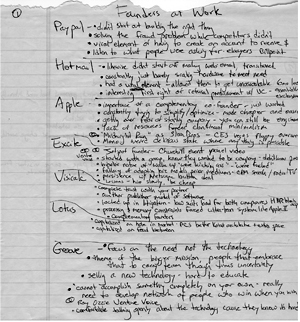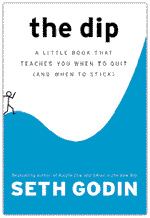 In every good sense of the word that is: he’s quit all the right things. I had the opportunity to see him speak in front of a group of about 300 this morning at the Tempe Improv in Arizona. His talk was themed around his latest book the dip and dealt with the subject of when it makes sense to quit. My friend Francine wrote up a great summary of the content of his talk this morning and Guy Kawasaki covered the book well in his interview with Seth. So rather than rehash either of those, in “purple cow” style, I’m going to cover what I believe was remarkable about both.
In every good sense of the word that is: he’s quit all the right things. I had the opportunity to see him speak in front of a group of about 300 this morning at the Tempe Improv in Arizona. His talk was themed around his latest book the dip and dealt with the subject of when it makes sense to quit. My friend Francine wrote up a great summary of the content of his talk this morning and Guy Kawasaki covered the book well in his interview with Seth. So rather than rehash either of those, in “purple cow” style, I’m going to cover what I believe was remarkable about both.
I finished reading the dip just now. At 75pgs and big print it took less time read it than to hear the talk he gave this morning. His talk was essentially a multimedia version of the book with a focus on anecdotes that make the message more memorable. Seth is a marketing wizard and everything he does draws upon the basic marketing pillars he espouses in Purple Cow. The $50 price tag for this morning’s talk was actually positioned as a mandatory 5-book buy and a free pep talk, which is genius because he knows people will give away the books and “sneeze” his message to others. The books themselves contain a “guest book” registry at the back and encourage the reader to pass it along once finished.
Screw the long tail
Seth takes the heretical position that we don’t quit enough. That’s right. We stick it out too often in a mediocre situation content with average performance in an average arena rather than achieving “rockstar status” in a smaller, more-differentiated arena. His argument is that in a society where we are flooded with choices and different options along with the ability to quickly research and connect with the winner, why would anyone choose 2nd (let alone 15th) place? While the “long tail” produces huge profits for companies like Amazon and Netflix across many selections, individuals represents only one of those selections and therefore should strive to be the juicy #1 in a long-tail-type situation. The relationship between #1, #2, #3, etc is non-linear because the “winners win big because markets love a winner” effect.
Everything you learned in school is wrong
This was a powerful and jarring statement but he is right: the academic system (in America at least) encourages the wrong thing: mediocrity. Which report card do parents and teachers reward more, the kid with an A-, B+, B+, B, B or the kid with an A+ and all C’s? And yet how as a consumer do you choose your physician or auto mechanic or decorator- do you care what grades they got in the other classes? I asked him the question “assuming that you can’t effect policy changes in the broken school system, what can a teacher do now to improve things and impress the dip thinking on kids?” He responded with a personal story about seeing a 6th grader sing “somewhere over the rainbow” for the first time in front of an audience of 400 parents and how that one experience galvanized that child to become a different individual growing up from that point, to seek out that “rockstar” level of heightened experience in everything she did thereafter.
Be the best in the world
The critical thing is how you define “the world.” He advocates being the best in your customers’ world. Depending on what you’re doing, the parameters of that world may mean “the best organic supermarket in a five block radius of Manhattan.” Whatever that world is, identify a territory that is tenable and worth occupying and then dominate it. The second half of his book is titled “If you’re not going to get to #1, you might as well quit now.” This is a message you would never hear in school or from your parents but given the premise of the new economy, I believe he’s right. Obviously this doesn’t apply to hobbies and leisure activities- it’s only for the areas that involve pain and sacrifice for the pursuit of a goal.
Applicability to JumpBox
So I’m always looking through the lens of how this applies to our own startup and the things that resonate:
So to summarize: These seminars are great but it’s not what you learn or don’t learn but how it ultimately alters your behavior going forward. Dips are good because they screen the rest of the jokesters from being able to have rockstar status- scarcity creates value and the Dip is to be embraced. Failure is different than quitting. Quitting strategically when you’re in a cul-de-sac instead of a Dip is smart because it frees you up to pursue the avenues worth pursuing. I highly recommend you see Seth speak if you get the chance, he is an inspirational presenter. It was an honor to meet him and get a personalized “moo” shout out from the Purple Cow himself!
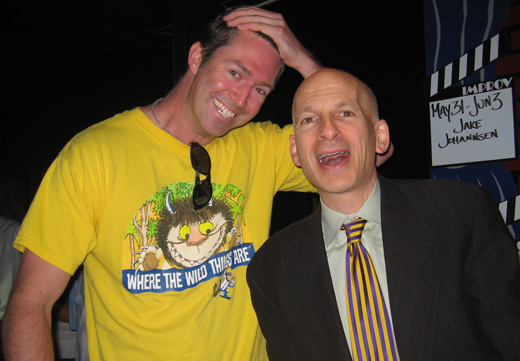
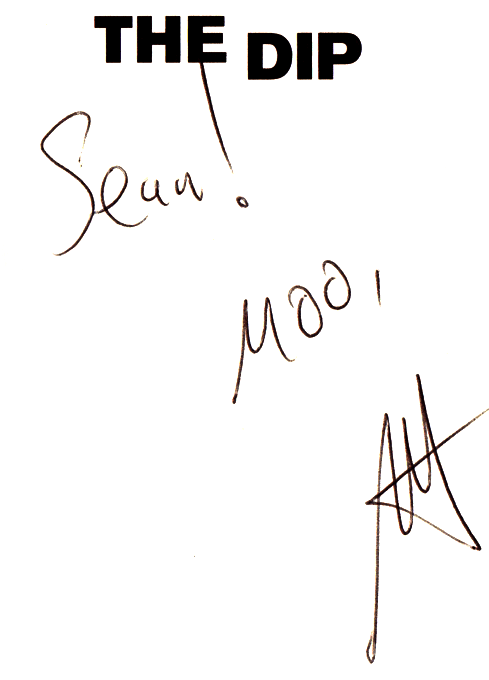













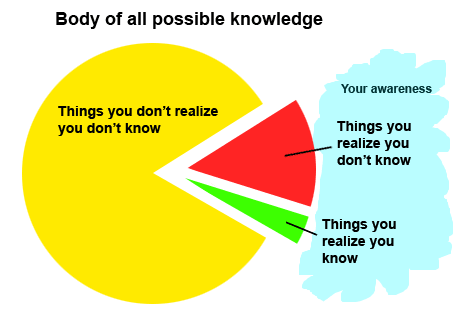
 My friend
My friend  If you’re like me you have a janitor’s key chain with twenty things on it. At least once a week I set off the panic alarm on my truck by accident because one of the gadgets on my key chain presses the button. In fact the only time I ever intentionally use the panic button is when I’m trying to
If you’re like me you have a janitor’s key chain with twenty things on it. At least once a week I set off the panic alarm on my truck by accident because one of the gadgets on my key chain presses the button. In fact the only time I ever intentionally use the panic button is when I’m trying to 

